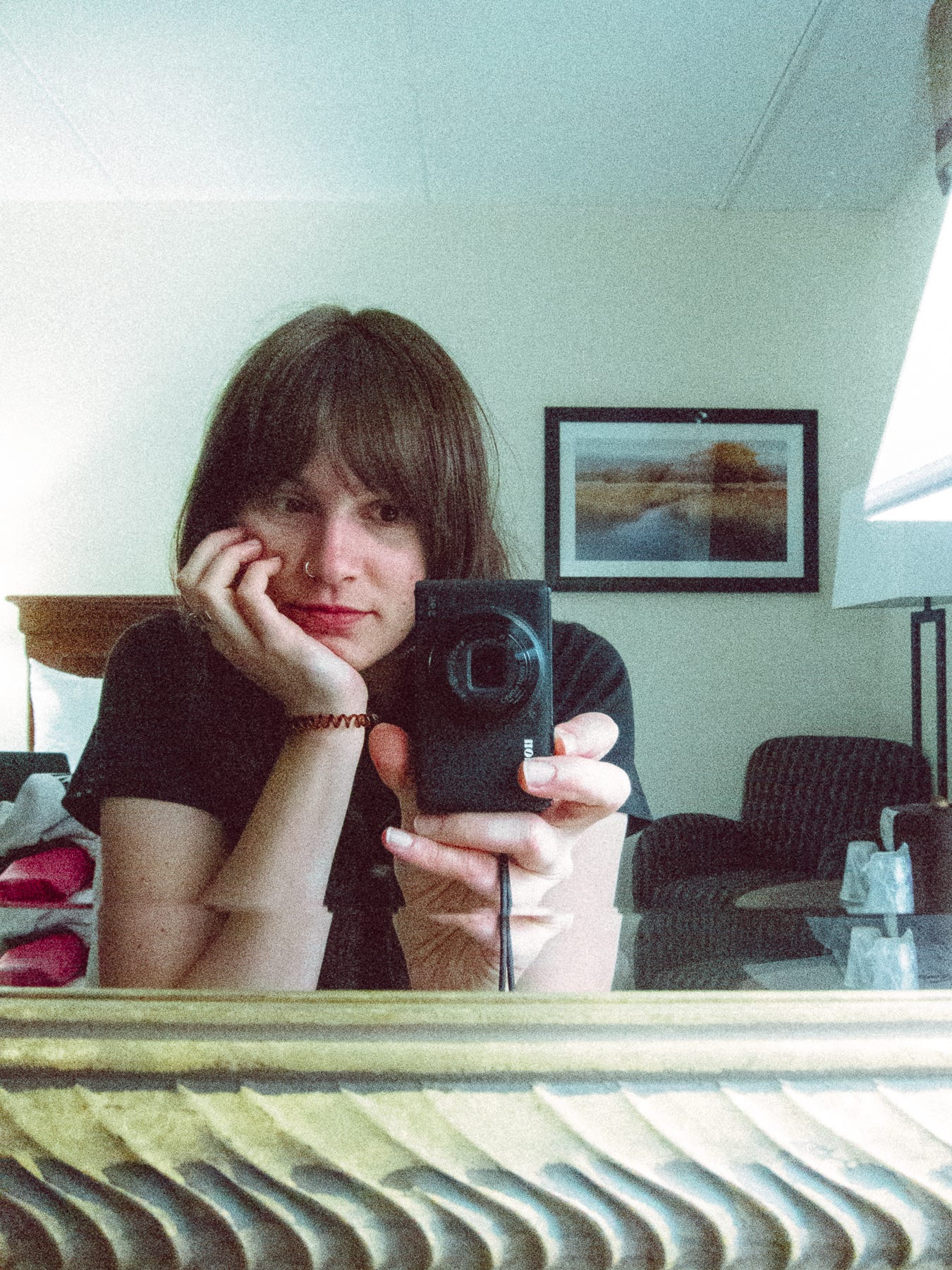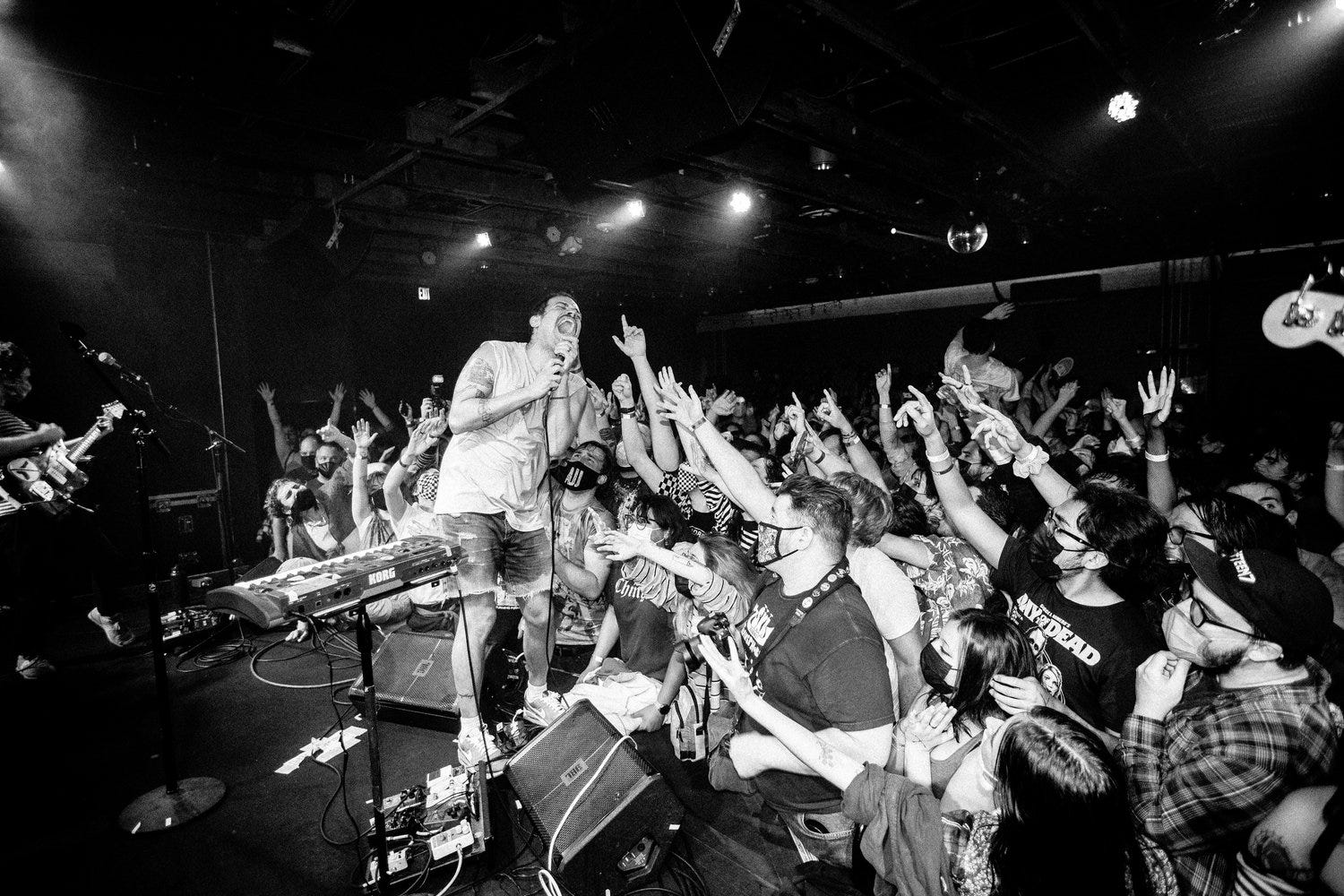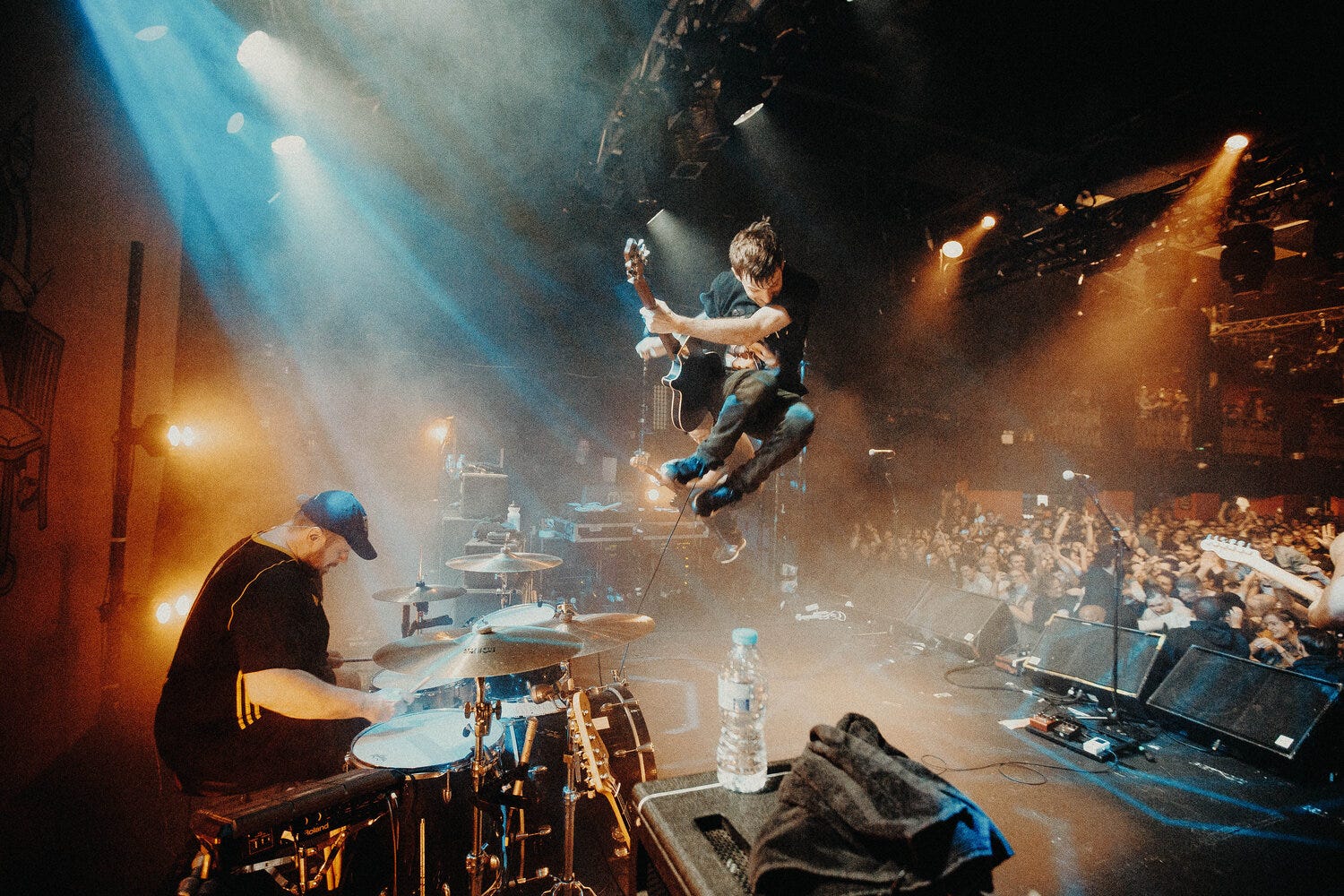An Interview with Photographer Amanda Fotes
Chatting about shooting the cover of SELLOUT and her new Slaughter Beach, Dog zine.
Hello and welcome to ZERO CRED, the only music newsletter in the world. A reminder that you can upgrade to a paid subscription for like $27 a year. You’ll get an official membership card mailed to you which will prove you are NOT A POSER and you will also be eligible for giveaways. Like today for example today I am giving away a few copies of the SELLOUT covers record I released last year along with 8x12” prints of the photo on the cover of SELLOUT signed by photographer Amanda Fotes who I interviewed below. If you’re already a paid subscriber, check the giveaway info after the interview!
One of the hardest parts about putting together my 2021 book SELLOUT was the cover. I just couldn’t get it right. Long email chains with my publisher ensued in which I tried to explain my vision. But maybe I didn’t actually have a vision and that was the problem. Maybe I wanted it to look like this or maybe I wanted it to look like that. This went on for several weeks until I was down to the wire.
Then one night I pulled a bunch of zines off my shelf and started flipping through them. Looking for inspiration, looking for… anything. I was admiring the pages of Collected Photos, a 2018 zine by my friend and immensely talented photographer Amanda Fotes. There are some jaw-dropping black and white shots of some of my favorite bands. Single Mothers’ Drew Thomson writhing around on the floor, Luke Bentham of the Dirty Nil playing a guitar with smoke billowing out of it, Jeff Rosenstock raising a triumphant devil horn at an outdoor festival. And then, right on the last page, a shot of Thursday at the Starland Ballroom. It was perfect. Geoff Rickly, one of the featured musicians in the book, was pointing straight up in the air, the crowd screaming his words back at him. This was it. There was no maybe about it. This was the photo I wanted. Amanda graciously lent me the photo for the cover and it has since become synonymous with the book. I’ll probably have to see that image for the rest of my life and I don’t think I’ll ever get tired of it.
I’ve been wanting to have a formal chat with Amanda about her work forever. She’s got a new zine out, Strangers on the Street, a document of a year on the road with Slaughter Beach, Dog, so now seemed like a good time.
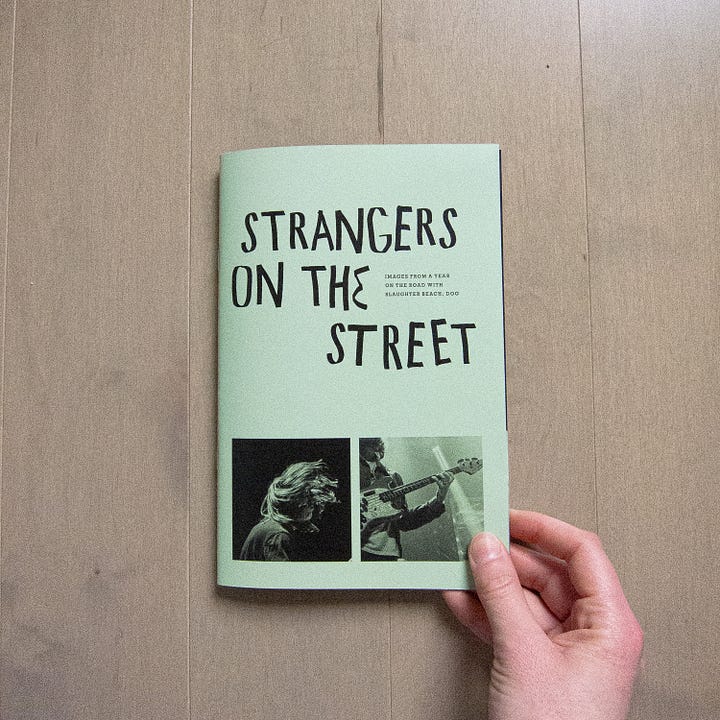

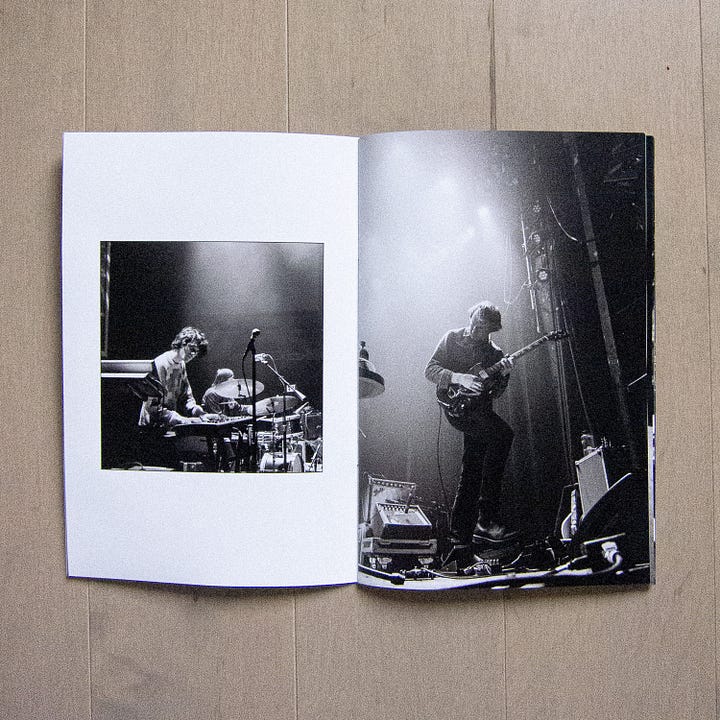
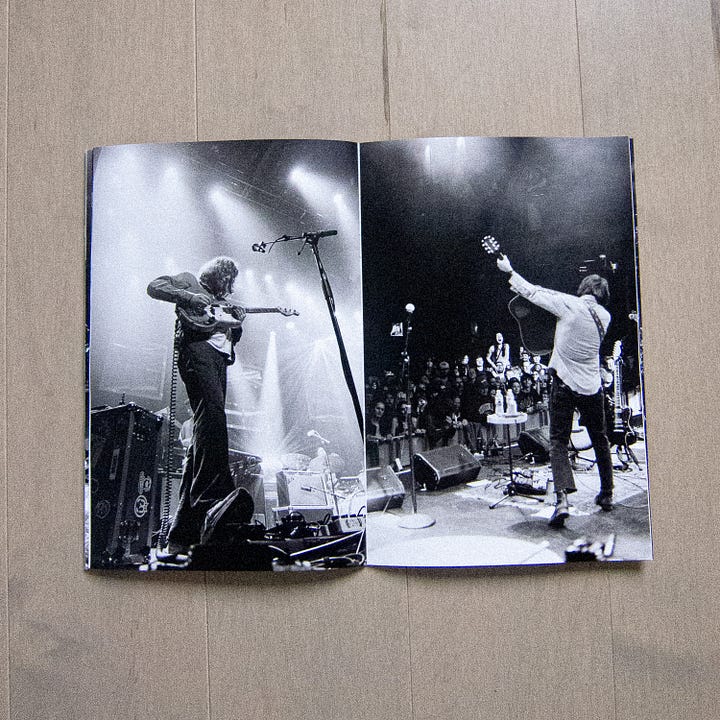
At the risk of starting this interview off in the most narcissistic way humanly possible…
Amanda Fotes: No, do it! Let’s go, let’s go. [Laughs]
People have told me how much they love the cover of SELLOUT and I'm wondering if shooting it had any effect on you as the photographer or if you've gotten any feedback on it.
It's funny because no one has outright said, “Oh, I found your shit because of this.” But I'll be talking to someone and SELLOUT will obviously organically come up...
Of course, yes, obviously, go on.
And I'm like, “I took the photo on that,” and they're like, “Wait, what?” Like, they just didn't know. And it's really funny because when I was out with Slaughter Beach, Dog last January, we went to Powell's Books in Portland and there's a shot of me in the bookstore in their music video. And there's no context, so it's just me holding the book up. And one of the comments was like, “Weird product placement.” [Laughs] I wanted to comment back and be like, “No no no it makes sense! I took the photo!”
I feel like you're that meme where it’s the party and the person is in the corner like, “They don't know I shot the cover of that book.”
Yeah! But people will know about the book and they'll know about me as a photographer and I feel like we were not quiet about the fact that I took that photo, but I haven't had bands knocking down my door to come take photos of them. I don't think people read the credits to stuff, like, ever.
Well, that's why I try to shout it from the rooftops whenever I can and I'm doing so here. For anybody reading, Amanda took that photo!
[Laughs] I did.
I actually don't think I know how you got started taking photos. When did that begin for you?
I had done two years of a criminology degree, and at the beginning of what would have been my third year, I decided that I didn't want to do that anymore. And the day that I withdrew from the program, I took my tuition money and I bought a 5D at the camera store down the street. I was only 19. That band Moneen was playing here and I brought the camera in, and that was kind of the beginning of it. It was mostly just lugging it to local shows for years and then kind of dipping my toe in the touring water with PUP, who would take me out. But it was a failed criminology degree and the tuition that allowed me to buy my first DSLR and that's how it started.
Was there a photographer or even a specific photo that inspired you?
There were some local photographers who were doing really cool stuff in the realm that I do, which is like, kind of harsh flash, black and white. I was ripping Charles Peterson off before I knew who Charles Peterson was by name, because all his Nirvana photos from that time are iconic. You've seen them 10,000 times but don’t necessarily look up the photographer. I had seen his shit for my entire life without even realizing that I was doing it. I read Our Band Could Be Your Life before I was shooting music, and his stuff is all over that, so I think he was my biggest influence without actually realizing it. And to this day I'm still ripping him off. [Laughs]
Your new zine is a document of your tours with Slaughter Beach, Dog. Is this the first time you’ve collaborated with the band you’re documenting?
Yeah. It's been really cool to have any kind of creative input into a band's existence. I've had photos in albums before or on t-shirts, but when
from Slaughter Beach, Dog hired me, the second tour we did together, we had a call and he was like, “We really want to emphasize photos, and film specifically, on this tour.” The last album that just came out, there's a few photos that his wife had taken of them in the studio, but for the most part, all the photos on that album are mine. Which was so fucking cool because that album is incredible and to have any part of myself in it was really cool, and I hadn’t had that with any band prior to this. I've always wanted to do some kind of band-specific zine or tour zine and the opportunity hadn't really come up because I hadn't been out long enough with a band or hadn't established the right kind of relationship. So this one feels really special. A lot of love went into it.How does the collaborative nature of that work?
I had entire creative control over it. I started putting photos together and I was like, “If anything feels not right to you or if you don't like anything in this, we can cut it out,” but they were very into it from the get-go which was nice. I've been shooting this band like a punk band since I started working for them, which is very much not what they are, but if you look at a lot of the images, they still feel kind of gritty and they're all black and white. It's not a band that sounds like that, but I think it still works, so they've kind of let me go in that direction.
I’ll bet young photographers would be very curious to know how you built that kind of trust and relationship with a band where you get that kind of access with them.
Right from the first tour that we ever did together, there's been a lot of trust on both sides of it. I don't think anybody in the band worries about me and what I'm doing. I kind of know when to back off. I shoot far more conservatively, I think, than a lot of photographers on tour will. Which is just my own insecurity about being annoying or too in-your-face. I try to keep it a little more reserved. I'm not shooting 100 percent of the time, which obviously means, yeah, I miss moments. There's shots in my brain that I know that I missed because my camera wasn't on me, but I also like to be present in the moment which I think is really important when you're building that relationship. There's not always a camera in your hand or in your face, so people aren't always anticipating a photo being taken. Everyone's just at ease all the time.
I feel like there's a stigma about photography that you have to be everywhere and you have to get up in people's faces to get good shots. But you are one of the most unobtrusive people I know. I feel like I've never actually seen you take a photo, which is so funny. What is your approach to photographing people in social situations like that?
I try to be as unseen as possible on stage and in the green room, very fly-on-the-wall. With a more in-your-face approach, you're gonna get incredible, crazy-good photos, but I don't have the confidence for that. I don't have the brain that works that way. So I find it easier for me to just sort of sit back and do it a little more reserved, which is maybe a flaw. I think everyone approaches it differently.
I imagine that when you get to shoot a band every night it gives you a great advantage over just shooting one show. You get into the rhythm of what the band does and when.
It's a blessing and a curse. A lot of tour photographers will say, “Man, how do I keep it fresh? I've shot every trick they've done on stage, I've shot every crowd interaction.” But the cool thing about music is that something new is gonna happen every night. The disco ball shot at Webster Hall, I knew that I wanted to get that photo because I'd been getting some variation of it with this disco ball that we had brought with us on tour. It was looking cool every single day, but that venue had an enormous one. I took ten photos that night and that was one of them, because I knew what I wanted, which is a luxury when you are on tour with a band. Yeah, it can get tiring and repetitive, but you also can walk into it with a plan. It's just not gonna execute a hundred percent the way that you want every single night.
We told the lighting director to hit the disco ball at this part of the set and I was standing in the wings. It just lit up the room and I waited ten seconds until I was like, “Hm, I should probably shoot this.” [Laughs] I still approach those moments in a wait-to-see-what-happens kind of way. I know that some photographers will just shoot constantly and walk out with like 800 photos and then cull through them. I've always tried to just wait to see what's going to happen.
This sounds like such an obvious question, but why do you put out photo zines?
I don't think that people print their work enough. Having your photo physically in front of you is really fucking cool. I've had some of my shit blown up to like five by three feet before and that is crazy. I think that a zine is just an offshoot of that. It's cool to have a physical object in your hand. There’s a variety of ways to tell a story in a zine if you do it right. With this one, people have said that it feels like being on tour, that the collection of images is what it’s like to be on the road. I think that's pretty cool because your average music fan won't get to do that or be backstage or hang out. We drove 36 hours back across the country at the end of the January tour. That shit's so tedious but it's integral to touring, and I think that doing a zine specific to one band or one tour will give you the story of what that tour was like. I still buy tons of zines and photo books. You can pull up your phone and scroll through photos, but it's not the same. There's a texture with printed work that's really cool.
Absolutely. I also think that people get so hung up on the idea that everything has to be their magnum opus. People fantasize about putting out a photo book that's their entire life's work, which, yeah, would be cool one day, but you can also just put out a zine of a few rolls of film that you shot, just because it’s a snapshot of the moment. I see zines as a much more immediate way to get your work out than waiting until you're on your deathbed.
I agree. There were other bands where I thought, “Maybe in a few years we'll put a coffee table book together, maybe we'll get all those photos together and really do something with them.” But like… why not after a tour? Why not just just do it? And it can be improved upon. I can get better and you can see the progression. You can even see how your relationship with the band has changed. I’m able to see that in photos. The stuff that I did early on is very different than what I do with them now, and that's been cool to see.
Last week I interviewed the skateboard photographer Matt Price. He said that he thought that the idea of skate photographer as a career is more or less dead, and that the way to get by as a skate photographer is to do a million different things in addition to actual photography—tour managing the team, shooting video. Do you think the same could be said of music photography?
Yeah, I don't think I've ever been hired just as a photographer for a tour. I tour manage Slaughter Beach, Dog and I'm okay with that. I really love shooting but I also just love logistics and being on tour. So I'd rather be on tour with two or three jobs and be able to shoot all the time. There are a handful of music photographers who are doing only that for a living, which is fucking cool. It's possible. You can do it. There are so many people that I'm friends with who are, if not there yet, will be there very soon. I don't see it for me. And that's fine. I don't see that as a personal failure at all, or that my shit’s not good enough. It's hard to just do a very niche photo thing for a living, so I do many other jobs to keep it sustainable.
Every musician I know has been telling me lately about how uniquely difficult and unprofitable it is to tour right now. As someone who also sees the tour managing side of things, can you tell me what struggles you've been dealing with over the last couple years?
Even in the two years that I've been doing it, it has gotten so much more expensive. Flying is so much more expensive than it was two years ago, gas prices. I know that a lot of bands who were in buses pre-pandemic can't afford the gas on a bus now. Van rental fees have doubled in the past four years. It's hard. There is money to be made touring. I've seen it. But it’s also very expensive to print merch, and then you have this added fear of getting COVID and having to cancel shows and being out all of this additional money because you can't sell the t-shirts anymore. All those things are upfront costs. And that’s on top of inflation and things doubling in price. It just feels very expensive. It's especially hard for a smaller band. Every show matters.
Another incredibly obvious question, but what, to you, makes a good photo?
The greatest compliment that I've ever been paid is when people tell me that it feels like they're there. When people look at the zine and say it feels like they’re on tour with this band, or that a photo makes it feel like they were in the room, that's when you've done it. You've accomplished what you set out to do.
I feel like in photos, bands can come off as people’s friends, hanging out and eating pizza, or there’s bands being larger than life rock stars on stage. Your zine, I think, captures both.
Thank you. I appreciate that. That is what I strive for all the time. I like detail in photos. I like to see what the room looks like. A lot of my live stuff is very wide. I won't edit a microphone stand out, or if there's something in the foreground, it's just gonna stay there. One, because I don't know how to use Photoshop, but also I just think you should do as much as you can to preserve the moment that was happening on stage. And that's not some kind of fucking photographer code of ethics thing. We're just looking at a real scene, and trying to keep everything as true to what actually happened as possible is pretty important for me.
I guess everybody has their own line of what's okay in photo manipulation. I agree with you that I'm not above a little bit of cropping or adjusting the alignment or something, but Photoshop now has these generative AI tools that can do all these things to a photo that feel disingenuous.
There's this shot I took of PUP in London…
With the water bottle in it?
Yeah! With the water bottle dead center in the frame. [Laughs] I brought it up in a poll on Instagram, like, should I get rid of this? Half of them said “yes, it's so distracting” and the other half were like “no, I don’t care.” I left it because I don't know how to get rid of it. I think they used it on that live album and I think Zack [Mykula] might have figured out a way to Photoshop it out, but it wasn't me.
On the gear nerd side, you just bought a Leica M6. Did you shoot anything with it yet?
Not yet. I was so worried that it was a knockoff because most Leicas have the M6 writing here in white paint and mine doesn’t. I went down a rabbit hole of “how do you tell if your Leica is real?” [Laughs] I’ve wanted this camera for like 20 years. Everyone's got like a dream piece of gear. I got paid some money for some tours and I figured I'm only young once. When I'm on tour, the live stuff is on a digital camera and everything else is on film. I can't get my brain to shift from that because it feels like shooting on film is a little more intimate and a little slower paced and a little more intentional.
A lot of photographers are very strictly either film or digital, but you don't seem to have a problem doing a mix of both.
No. The thing that's cool about the zine is that I shot film and digital in it, and I don't think you would be able to tell which is which except for a few images that are very obviously digital. I don't have a preference. I have been shooting with a 5D since I started shooting music.
Who do you really want to shoot that you haven't yet?
The bands that I work for feel like enough. I had a bucket list but I just don't shoot a lot of nationally touring acts anymore. I'm not on a publication. I'm just kind of happy where I'm at. I like building that relationship more than I like chasing a bucket list. I don't know if that's a lame answer or not, but for me the really special part of this job is getting that access and having the ability to just see a different part of music that most people don't get to.
This interview has been edited for length and clarity.
VINYL + PHOTO GIVEAWAY
Thanks for reading. I’m going to give away a few records and Amanda’s prints to my paid subscribers now. So if you don’t have a paid subscription, this is where I leave you!


